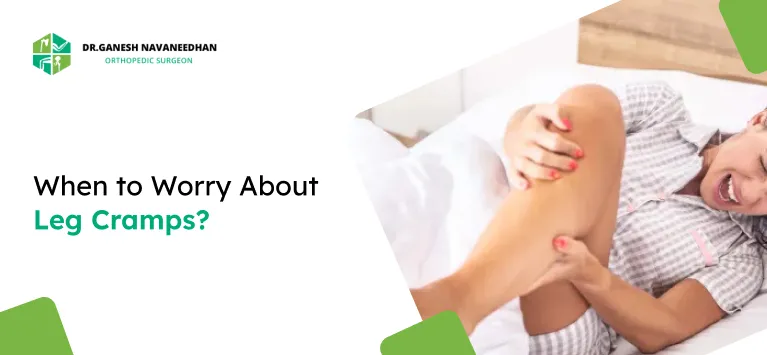- +91 62384 78716 +91 99475 78797
-
Sasthamangalam, Trivandrum
Sasthamangalam, Trivandrum

Leg cramps are sudden, involuntary muscle contractions that can cause significant discomfort, often occurring in the calf muscles. While they are usually harmless, it’s essential to recognize when to worry about leg cramps, as they can sometimes indicate underlying health issues. In this blog, we will explore the causes of leg cramps, when to seek medical attention, and effective home remedies to alleviate and prevent them.
Leg cramps are sudden and involuntary muscle contractions that cause pain and tightness, usually in the calf, thigh, or foot. These cramps can last from a few seconds to several minutes and may occur during rest, exercise, or sleep. They happen when muscles contract too tightly and fail to relax, leading to discomfort.
Leg cramps can result from various factors, including:
Understanding these causes can help in determining when to worry about leg cramps and whether they may be a sign of a more serious condition.
While occasional leg cramps at night or during the day are common and typically harmless, certain situations warrant medical attention:
Recognizing when to worry about foot cramps or leg cramps is crucial for timely intervention and management.
Leg cramps are not typically associated with cancer. However, certain cancers or their treatments can lead to electrolyte imbalances or nerve damage, potentially causing cramps. If you experience persistent or unexplained leg cramps at night, especially with other concerning symptoms, consult a healthcare professional for a thorough evaluation.
Several home remedies for leg cramps can provide immediate relief and help prevent future episodes. If you’re wondering how to stop leg cramps immediately, these simple remedies can help:

These remedies can be effective in managing leg cramps at night treatment and during the day.
Leg cramps can be relieved by stretching the affected muscle, gently massaging it, or applying heat to relax the muscle fibers. Staying hydrated and ensuring a balanced intake of essential minerals like potassium, magnesium, and calcium can help prevent cramps. Regular physical activity and avoiding prolonged inactivity also play a crucial role in reducing their occurrence.
To reduce the occurrence of leg cramps at night:
Implementing these strategies can serve as a cure for leg cramps at night and reduce their frequency.
A deficiency in essential minerals such as potassium, magnesium, and calcium can contribute to leg cramps. These nutrients play a vital role in muscle function, and their imbalance can lead to involuntary contractions. Dehydration can also disrupt electrolyte levels, increasing the risk of cramps. Ensuring a nutrient-rich diet and staying well-hydrated can help prevent them.
To stop leg cramps at night, stretching the affected muscle immediately and applying heat or massaging the area can provide quick relief. Staying hydrated throughout the day, eating a balanced diet rich in electrolytes, and stretching before bed can help prevent nighttime cramps. Wearing supportive footwear and avoiding prolonged inactivity may also reduce their occurrence.

Leg cramps are common during pregnancy, especially in the second and third trimesters. They are often due to increased weight, changes in circulation, and pressure on nerves. While usually harmless, if cramps during pregnancy are severe, frequent, or accompanied by swelling or other symptoms, it’s important to consult a healthcare provider.
Leg cramps are a common experience that can often be managed with simple home remedies for leg cramps and lifestyle adjustments. However, it’s important to recognize when to worry about leg cramps, especially if they are frequent, severe, or accompanied by other symptoms. Consulting with a healthcare professional can help identify any underlying causes and ensure appropriate treatment.
Copyright © 2025 Dr. Ganesh Navaneedhan. All Rights Reserved. | Designed By Harvee healthcare